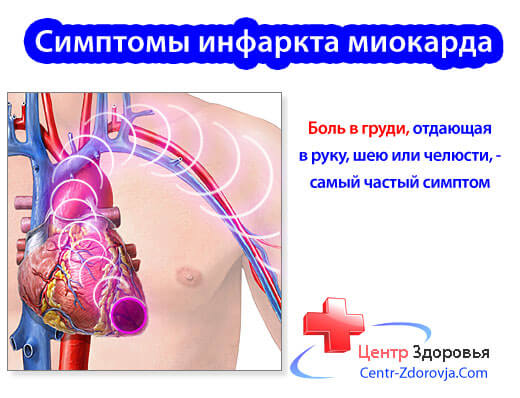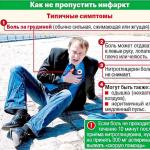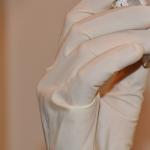Symptoms of myocardial infarction are usually pronounced. The pain in the chest is so severe that it causes shock. Many heart attack survivors say it was the worst pain they've ever experienced. However, in 25% of cases, the symptoms of a heart attack are fuzzy, especially in women. In such cases, a heart attack can be mistaken for the flu or work fatigue.

Heart attack symptoms: detailed article
Blurred symptoms of a heart attack are dangerous because the patient may not understand the seriousness of his illness. If you do not call an ambulance, then the risk of dying within the next hours or days increases many times over. Timely medical care for a heart attack gives phenomenal results. Many patients manage to save the heart muscle from dying off. They return to normal life, without the consequences of a heart attack. However, for this you need to correctly assess the situation and take action in time.
Symptoms of myocardial infarction
| Discomfort, chest pain | The chest may feel pain, discomfort, pressure, or constriction for a long time. Symptoms may be continuous or transient. |
| Pain in the upper body | From the chest, pain can radiate to the shoulders, arms, back, neck, jaws and teeth. Pain in the upper body without discomfort in the chest is also possible. |
| Stomach pain, nausea, vomiting | Pain from the chest can move down to the abdomen. It may look like heartburn. There may be a feeling of fullness in the stomach, nausea, vomiting. |
| Labored breathing | There may be shortness of breath or difficulty when trying to take a deep breath. These symptoms develop even before chest pain appears. Or there may be no discomfort in the chest at all, but only shortness of breath. |
| Anxiety | Feelings can resemble a panic attack for no apparent reason. Also, many patients at the time of a heart attack experience a sense of their own doom to death. |
| Dizziness, sweating | In addition to chest pressure, patients complain of dizziness. Fainting is also possible. During a heart attack, people often sweat a lot. At the same time, their skin is cold, sticky to the touch. |
Each patient has their own symptoms. No two cases of myocardial infarction are the same.
You will need this:
About 25% of heart attacks cause no symptoms at all and are silent. Unfortunately, this does not make them less dangerous to health and life. Asymptomatic heart attacks are more common in women, the elderly, and diabetic patients.
The first signs of a heart attack
Myocardial infarction is the most common cause of death. About 40% of people die from it. This is higher than the death rate from all types of cancer combined. Below is a list of the first signs of a heart attack, as well as a pre-infarction condition in which a catastrophe can still be prevented.
| Anxiety | A heart attack and a pre-infarction state can cause severe anxiety, fear of death. People who have experienced a heart attack often say that they experienced a sense of doom, the end of their lives. |
| Discomfort in the chest | In 25% of cases with a heart attack, patients complain of chest discomfort, but they do not have pain. This is especially common in women. There may be sensations of pressure, tightness of the chest, or fullness in the stomach. Take these signs seriously. |
| Cough | Persistent coughing or shortness of breath can be symptoms of heart failure. Coughing occurs due to the accumulation of fluid in the lungs. Sometimes patients with heart failure cough up sputum, as with colds and tuberculosis. |
| Dizziness | Dizziness and fainting can signal a life-threatening cardiac arrhythmia. Also, a heart attack can cause loss of consciousness in a patient. |
| Fatigue | A symptom that is especially characteristic of women. They may feel strangely tired for many days and months leading up to a heart attack. Fatigue can also be a symptom of heart failure. |
| Nausea, loss of appetite | At the time of a heart attack, many people feel fullness in the stomach, nausea. Heart failure can also cause bloating and loss of appetite. |
| Pain in other parts of the body | Usually, with a heart attack, a person feels pain in the chest, which radiates to the shoulders, arms, elbows, back, neck, jaws, and stomach. However, chest pain may or may not be present. In this case, other parts of the body will give signals of trouble. |
| Fast or irregular heartbeat | Everyone has an irregular pulse sometimes, and there is nothing to worry about. However, if tachycardia (high heart rate) or skipped heart beats are accompanied by fatigue, dizziness, shortness of breath, this may be a sign of heart disease. Check for heart failure and arrhythmias. |
| Dyspnea | If a person is short of breath at rest or with little exertion, it may be a symptom of asthma, chronic obstructive pulmonary disease, heart failure, or a heart attack in the legs. See a physician or cardiologist. |
| Sweating | A person covered with a cold sweat is a common symptom of a heart attack in men and women. Moreover, the patient can sweat even at rest, without being subjected to any physical exertion or emotional stress. |
| Edema | Heart failure often causes swelling of the ankles, feet, and an enlarged liver. This may be accompanied by an increase in body weight. Explore. Take CoQ10 and other supplements to improve your heart's energy production. |
People who were able to recognize the pre-infarction condition by the first signs and went to the doctor in time can consider themselves lucky. However, more often the symptoms of trouble are visible to friends and family members, and not to the patient himself. Be prudent. Pay attention to the signals your body is giving you.
How supplements help with cardiovascular disease:
- magnesium-B6 - the main mineral for the heart, normalizes heart rhythm;
- coenzyme Q10 - rejuvenation of the heart;
- L-carnitine - quickly gives vigor improves well-being;
- fish oil - omega 3 fatty acids, against the formation of blood clots in the vessels.
Read more:
Heart attack symptoms in men and women
As mentioned above, in women often the symptoms of a heart attack are blurred, while in men they are usually clear, as in a textbook of cardiology. Many women die because doctors ignore their symptoms and send them home with a prescription for a sedative tincture or a sick leave to be treated for the flu. Although basically the patients themselves are to blame for ignoring their symptoms. Both men and women are equally guilty of this.
Read detailed articles:
Myocardial infarction is always a problem for people who do not pay attention to the warning signals from their bodies. The textbooks say that in 50% of cases, the first symptom of a heart attack is sudden death, in 25% - a pronounced heart attack, another 25% of heart attacks pass without visible signs. In fact, there are always early signs that are described above. The main thing is to evaluate them correctly and not be shy to consult a doctor.
Feeling discomfort in your chest? See a physician or cardiologist. Do an EKG, preferably a stress EKG.
Feel bad? Call an ambulance, don't waste time. They still need to get there.
Resist the temptation to write off your symptoms as fatigue, stress, or a cold. It is impossible to describe in words how important it is to get medical help in time for a heart attack. This is a matter of life and death. It is necessary to treat a heart attack only in the hospital, in no case at home. Because only in a hospital it is possible to cope with complications - ventricular fibrillation, impaired atrioventricular conduction, pulmonary edema. These and other deadly complications often occur in the first hours and days after the onset of the acute period.
The results of the treatment of a heart attack depend on first aid no less than on the actions of a doctor. Will the people who will be next to the patient at the time of a heart attack behave competently? Will they be able not to panic? Will they call an ambulance? This will determine what the consequences will be, whether the patient will remain disabled or return to normal life.


